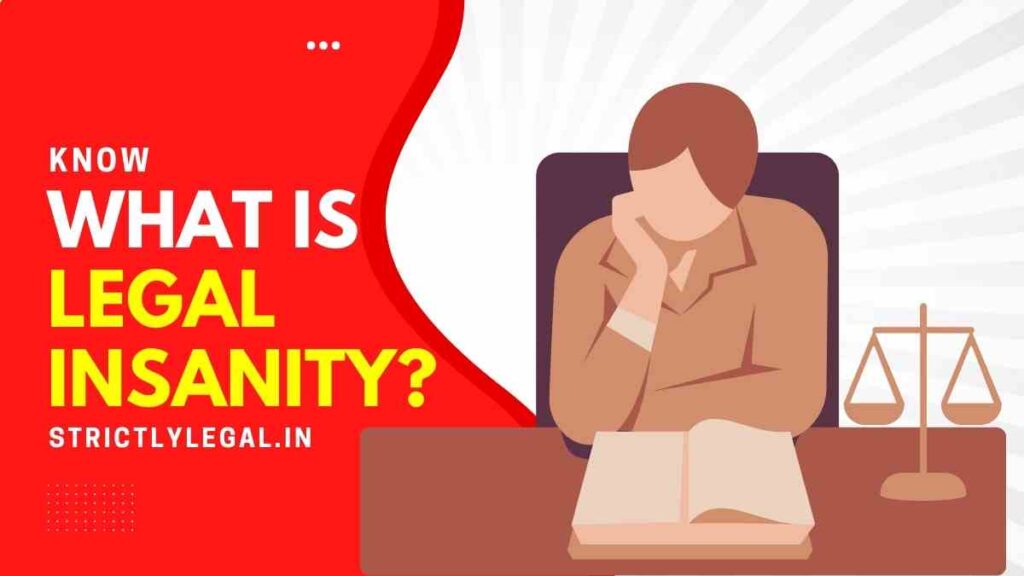Insanity is a defense and an exemption that is written over in Chapter IV of the Code of Criminal Procedure, however, in a court of law, it is way harder to prove insanity as a defense than it seems easier on paper. Insanity has further been divided into two categories- Legal Insanity and Medical Insanity. There is a well-known principle of law named “Actus Non Facit Reum Nisi Mens Sit Rea”, which in layman’s terms portrays that an act does not make an offender accountable without a guilty mind. The Intention or Guilty Mind of the offender/ accused is an essential part while committing a crime. The defense of insanity whether medical or legal is a statute or a law that shields a person who is incompetent and incapable of understanding the conduct performed by him. The frailness of mind must be of such an extent that it makes the offender absolutely and completely incapable and incompetent in acknowledging the nature of the act. The fact/ factor that a person A is undergoing mental illness is itself not ample enough to prove that he is insane. Under the Indian Penal Code, 1860 the reasoning of Insanity as a defense is assimilated u/s 84.
Table of Contents
Medical Insanity
As a presumption from the term “medical insanity,” does not portray that a person is crazy or mad. Medical insanity means a person who is an offender of an alleged crime is under medications or with consultation may it be with a psychiatrist or a consultant or a therapist but are capable of making informed decisions and can do for them and lead a normal life.
Legal Insanity
Legal Insanity is a situation where a person has to be placed under direct supervision having no ability to take decisions in things or circumstances that are related to finance or else someone else has to take the responsibility on their behalf and do the bidding. Insanity is often considered as a mental thing but in specific cases, it may be due to physical causes like Alzheimer’s Senile Dementia etc. A person might be ill mentally but not insane legally, since things like stress or pressure are also considered as mental illnesses. To prove that the offender is legally insane it takes three psychiatrists to declare the same followed by the Honorable Judge contending that the offender is legally insane and is unfit to function in society. In worst cases, the offender is sent to a psych ward.
Origins of the Rule on Insanity as a defense
The Insanity law as a defense has been present since long ago but it got recognition and took a legal status in the last three centuries.
The first case that took over to prove the concept of legal insanity was R v. Arnold (1724) it was contended that an offender may demand immunity if, due to his unsoundness of mind that he was incompetent and incapable of differentiating between the good and the bad, and did not by any means know the conduct performed by him, he could not be guilty of any offence under whatsoever law. This test is termed as “Wild Beast Test”.
The second test was performed in Harfield’s Case (1800) where the counsel for the accused argued that the accused just pretended to kill King George III on the ground of insane delusion from which the accused was undergoing and is not guilty. This test was known as the “Insane Delusion Test”.
Concluding this, the third test was contrived in the Bowler’s Case (1812) the counsel argued that it is upon the discretion of the jury to decide when the accused committed the offense, whether he was competent and capable of differentiating between good or evil or was under the control of an illusion.
Indian Law on Legal Insanity
As mentioned above, Insanity has been provided u/s 84 of the Indian Penal Code, 1860 as a defense in India. But, it is to be kept in mind that the word “insanity” has not been used anywhere in the Code nor in the section rather IPC uses the term “mental soundness”.
Section 84 of the Indian Penal Code states that-
“Nothing is an offence committed by someone who is currently unable to know the nature of the act or does what is wrong or contrary to legislation due to a lack of a sound mind.”
Indian Penal Code, 1860
For the defense to prove that the accused was legally insane they must have to prove that the accused/ offender was in a state of unsoundness of mind while performing the act and he was unable to figure out the nature of the act or what is wrong in the eyes of law.
M’Naughten’s Rule
There have been various tests on legal insanity time and again like the Wild Beast Test, and Insane Delusion Test as mentioned earlier in the article but the most important among them all is the “Right and Wrong Test” that was contrived in M’Naughten’s case.
The hearing of M’Naughten was a hot topic of discussion in the House of Lord and an honorable bench of fifteen judges were called upon to come to a conclusion on the question raised that in cases where the accused/ offender is incapable and incompetent of understanding the nature of the conduct and actions committed by him. Out of fifteen, fourteen judges opined similar thoughts and answers, they are as follows:
- If the offender knew what he was doing or was under a partial delusion, he is punishable.
- There is a chief presumption that every common man is prudent and sane and is aware of what he is doing and also stays responsible for the same.
- To form a defense on legal insanity, it must be discovered, at the time of committing the act.
- A person who has ample knowledge of medical or is a medical fan or is well versed with the disease of insanity cannot be asked to give his suggestions or opinions since it is on the Honorable Jury to determine, and decide upon the issues raised.
Conclusion
After reading the article you must have understood that there is no term called “mental insanity” as such under any law in India, rather there shall be a proper, well-defined statute and definition on the same to view things clearly and also to avoid any sort of loopholes while arguing in the Court of Law.

Law student.
Turning legal insights into engaging narratives.





